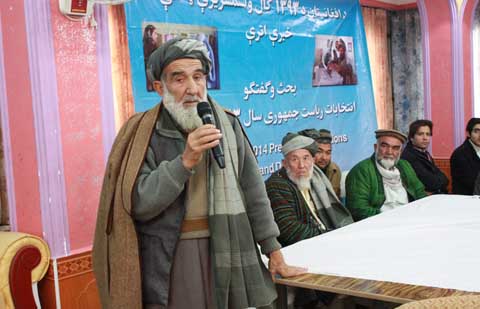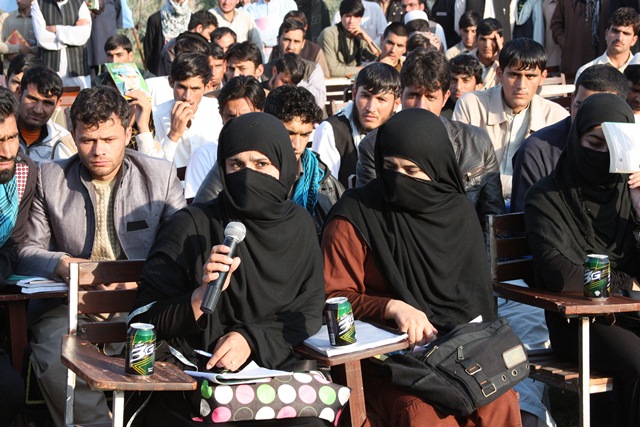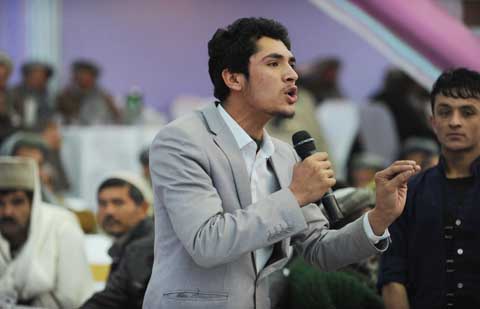KABUL - A series of United Nations-facilitated public debates and discussions on the importance of the public’s participation in Afghanistan’s Presidential and Provincial Council elections, slated for next April, concluded this week with 13 such discussions, which saw active participation of officials as well as the members of the public.The discussion series - ‘Afghanistan’s 2014 Presidential Elections – Debate and Discussion’ - started in the provinces of Bamyan and Paktya on 3 November and covered several other provinces including Kandahar, Helmand, Nangarhar, Kunar, Dai Kundi, Herat, Farah, Badakhshan, Kunduz, Balkh and Jawzjan during the course of seven weeks. The last of the discussions, which were broadcast by local media, was held in the north-eastern Afghan province of Kunduz on Sunday.
Highlighting the importance of these discussions, facilitated by the UN Assistance Mission in Afghanistan (UNAMA), the Mission’s acting communications director, Ari Gaitanis, said at the start of these series that the efforts sought to provide a venue to exchange ideas and views on the elections.
“These discussions were facilitated in support of the efforts by Afghan electoral authorities to inform the public about the critical importance of its participation in the polls for the process and the outcome to be credible and widely-accepted,” said Mr. Gaitanis.
The gatherings featured a range of speakers from governmental institutions and civil society, amongst others, speaking on panels, with a wide cross-section of members of the public – including government officials, community elders, students, members of civil society, community elders and academics – invited as interactive audience members.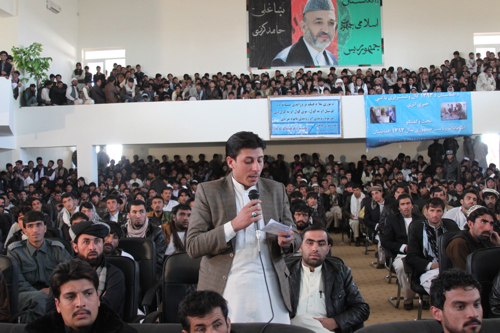
UNAMA is committed to support the Afghan-managed and Afghan-led elections, slated for 5 April 2014, along with polls for Provincial Council, at the request of national authorities and as mandated by the UN Security Council. Next year’s Presidential elections will mark Afghanistan’s first ever transfer of power from one elected president to another.
Over 600 people attended the last of 13 discussions, organized in Kunduz, on Sunday. Addressing the audience, a police spokesperson, Sayed Sarwar Hussaini, tried to allay security fears about participating in the historic polls.
“Our pre-election security measures include cleaning-up operations, establishing new security check posts and establishment of the Afghan Local Police in some areas of the province,” said Mr. Hussaini.
Other speakers highlighted the importance of women’s participation in the process – both as candidates and the electorate. Out of 107 candidates for the 15-member Provincial Council of Kunduz, only five are women.
“The low number of women candidates registered for the Provincial Council elections in Kunduz shows that there still are threats against women,” said one of the speakers, Hayatullah Amiri of the Afghanistan Independent Human Rights Commission (AIHRC).
Some 3,000 people had attended the inaugural discussion in Paktya province, held in its capital city, Gardez, on 3 November. Similar event held in the central Bamyan province drew some 400 people on that day.
“Every single person represents a family and each of them can deliver election messages to their families that will positively affect the electoral process,” an outreach officer with the IEC, Sher Ali Faizi, told the audience in Gardez.
Speakers in Bamyan highlighted the importance of women’s participation in the election process.
“If women want to change their lives, then the time has come – participating in the upcoming elections is the quickest and most efficient way to change their lives,” said Shukria Nida, a women's rights activist speaking at the Bamyan event.
The concerns were shared by speakers of another discussion event held in the neighbouring Dai Kundi province on 9 December, which was attended by some 1,500 men and women.
At the discussion held in eastern Nangarhar province on 10 November, speakers highlighted the issues such as security, role of media, transparency and fairness, awareness campaigns and mobilizing the people to take active part in the polls.
One of the speakers and a women’s rights activist, Balqis, called on family elders to allow female members of their families to participate in the upcoming elections. The Nangarhar event, organized it the provincial capital, Jalalabad, also saw a theatre group stage a 15-minute drama with the message calling on the people to participate in the election.
At a similar discussion held in northern Jawzjan province on 11 November, the IEC’s provincial chief, Mohammad Aman Faryabi, said despite anti-election campaigns launched by insurgents “to make political gains and defame the democratic process,” the election body has made progress in its polls preparations.
“Failure of the election process could bring disastrous consequences to the people of Afghanistan,” said Mr. Faryabi.
In the neighbouring Balkh province, the Director of Women’s Affairs Department, Rabia Maryam, said in her comments – during a discussion held on 24 November – that more than 60,000 women have obtained new voter cards, “which shows a huge increase in women’s participation in the democratic process.”
Security was the common concern of all most speakers and participants at a similar discussion, held in southern Helmand province, on 28 November, and another discussion held in neighbouring Kandahar province on 15 December.
“If there is no security, we will not be able to have free and fair elections because candidates will not be able to carry out their political campaigns. Moreover, voters will be reluctant to go to the voting centers amid security concerns and this phenomenon will pave the way for fraudulent elections,” said the the secretary of Helmand Provincial Council, Athaullah Khan.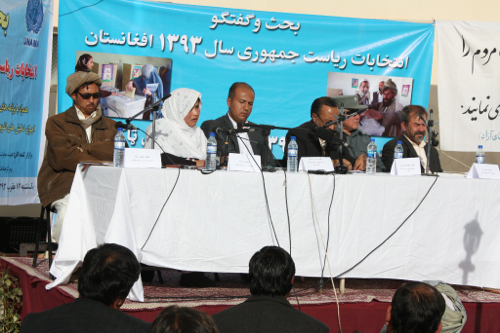
The Head of Kandahar’s Women’s Affairs Department, Rukia Asakzai, complained about the lack of public awareness on the election process, particularly for womenfolk in rural areas. She stressed for more awareness programmes through mass media in order to educate women in inner hinterlands.
The Helmand provincial government spokesperson, Mohammad Omar Zwak, assured the participants that all efforts would be made to create conducive environment for the people of the province so that they could cast their votes with full peace of mind and the candidates could campaign for the elections without any trouble.
The discussion in eastern Kunar province, held on the same day as in Helmand, saw a group of seven young poets deliver messages of peace and unity through their poetries.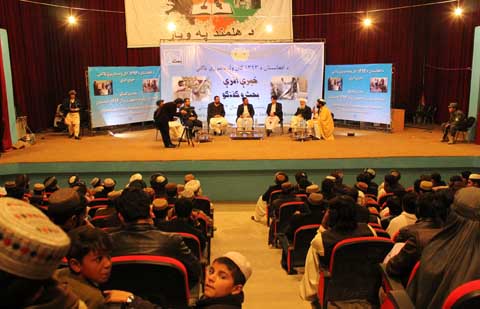
In western Herat province on 1 December, speakers urged the people to rise above their ethnic identity “vote for the benefit of Afghanistan, and not for their respective ethnic candidates.”
For the people of the north-eastern Badakhshan province, as they said at a discussion on 9 December, the main concern was the severe weather condition that is likely to make things difficult in the months ahead of the polling day.
“In view of the extremely challenging climate in Badakhshan, many eligible Afghan citizens would not be able to use their right to vote, while the IEC would also face a huge challenge with regard to its public outreach activities,” said the Deputy Head of the Badakhshan Civil Society Forum, Sayed Omar Baheer.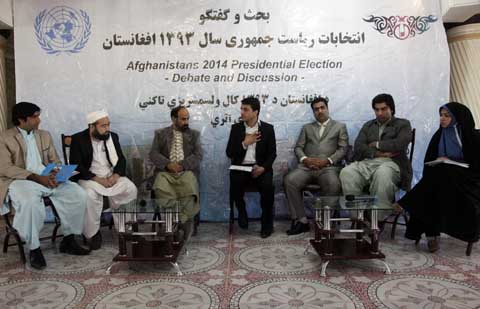
At a discussion held in western Farah province on 15 December, a religious scholar, Maulawi Ezatullah Nazari, pledged to highlight the importance of the upcoming elections during their Friday sermons.
Related article:
- Speakers in UN-facilitated debates highlight importance of participating in next year’s polls



